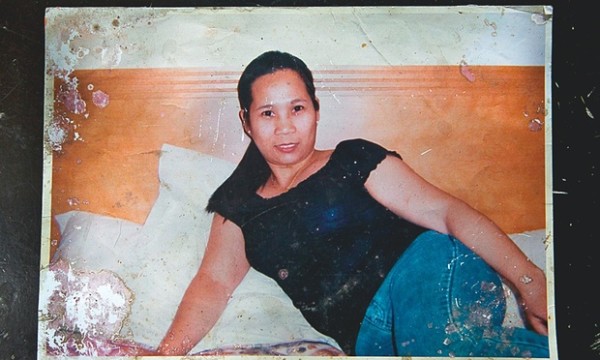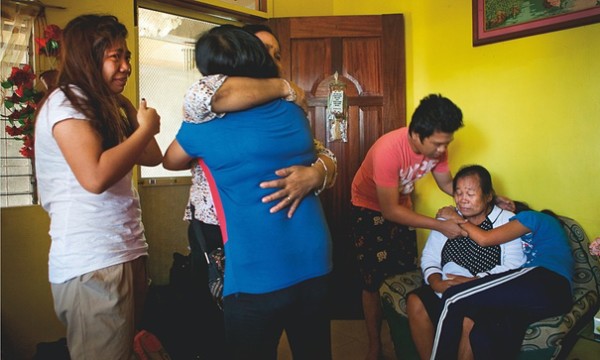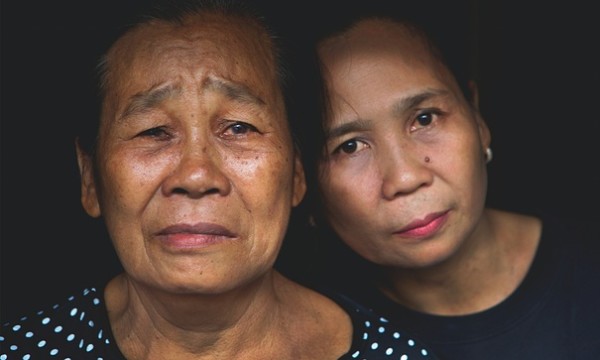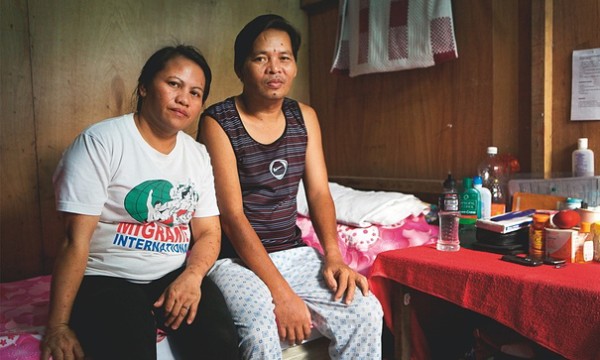The Vanishing Filipino Overseas Workers.
October 29, 2015 · By Annie Kelly and Hazel Thompson for www.theguardian.com

Marilyn Restor. Photograph: Hazel Thompson
Two years ago, Marilyn Porras Restor kissed her three children goodbye, wiped away their tears and told them she’d try to come home again soon. She left the family house, in a dusty neighbourhood in the city of General Santos in the Philippines, as she had done many times before. Only this time, she never came back.
Like hundreds of thousands of other families across the Philippines, Marilyn’s children had largely grown up without their parents. Raised by their aunt, they went to school, rode bikes and played football with their friends, while Marilyn and her husband Arnulfo cooked, cleaned and drove cars for other families thousands of miles away in Saudi Arabia, sending the money they earned back home.
There are now 53 million domestic workers worldwide – many of them migrant workers such as Marilyn, travelling from poor countries to richer ones to work in private households. In the Philippines, where 25% of the country lives under the poverty line and many families struggle to keep their children in school, the lure of a job abroad has pulled more than 10 million people out of their homes and scattered them across the world, many in Gulf nations. Official remittances sent back to the Philippines by overseas workers now top $26bn, or nearly 15% of the country’s GDP.
Once or twice a week, without fail, the Restor children would gather around a laptop as Marilyn’s pixelated face appeared on Skype, scolding them about their homework and listening to their test results and friendship woes. Then, one day, without warning, the calls stopped.
The family’s desperate search for Marilyn ended in a morgue in the Saudi Arabian capital, Riyadh, over a year later. Arnulfo, who was working in Saudi as a driver for a different wealthy family, received a phone call asking him to come and identify a body. The Marilyn he had known was robust and strong. When he pulled back the sheet, he found little more than skin and bones.
A week later, in the corner of their small living room, Marilyn’s two daughters, Ana, 18, and Lunycar, 12, are sobbing, their bodies bent around their grandmother, Nani. The house is heavy with their grief. When he tries to talk about his mother, Marilyn’s son John struggles to get his words out. “She was a good mother… She was strict, but she loved us.”

Marilyn Restor’s children Ana (far left), John (fourth from left) and Lunycar (far right). Photograph: Hazel Thompson
John is 21, but his despair makes him look like the young boy Marilyn had to leave behind 12 years earlier, when she first went to work in Saudi. He stops and angrily brushes tears away with the back of his hand. He wishes he had worked harder at school and made her proud. “I just want to tell her that I miss her, even if I was a stubborn son before. I miss her so much.”
For over a decade, Marilyn had a good job with a member of the royal family in Riyadh. She was respected, and the money she sent home put John and his sisters through school and college, and paid her mother’s hospital bills. Then, last June, she went missing from her employer’s house. Her husband was told she had been kidnapped and forced to work for another faction of the royal family. Arnulfo says he got the address of the house and went to find her, but was shot at by armed guards. Nobody in the Philippine embassy or the Saudi police would help them. The family who took Marilyn became the subject of a formal complaint from the Philippine government to the Saudi authorities, alleging abuse and imprisonment of a number of domestic workers, and asking for information about another three missing women linked to the same address.
Back in the Philippines, Marilyn’s family were frantic. They trailed around government departments asking for help, but got nowhere. “We believe our government could have rescued her at any time,” says Marilyn’s sister Lani. They circulated the address where they believed Marilyn was being held as widely as they could. “We would go and visit officials [in different government departments] to try and get help. We were begging them. We were so pitiful.”
The family heard nothing from Marilyn for nearly 12 months, except for one brief phone call last October, when she managed to speak to John for a few minutes. “She said she was OK and that I love you, please don’t worry about me,” says John. “We thought she was going to be all right.”
In Saudi, Arnulfo is involved in an ongoing attempt to get Marilyn’s body brought home. The family who took her have offered them money, but Arnulfo and his children want answers: they want to know how and why she died. Arnulfo was told by an official at the Philippine embassy in Riyadh that she had probably been pushed off a roof.
“Her children just want her home,” Lani says. On the couch, John and his sisters are staring blankly at their phones. Lani says the worst thing for all of them is wondering what Marilyn went through in those final months. “We just want her back, but it’s too late.”
***
According to the United Nation’s International Labour Organisation, domestic workers are some of the most likely to face abuse and exploitation in their place of work. A number of cases in the past few weeks have made international headlines: an Indian domestic worker who had her arm chopped off, allegedly by her employer when she asked for her wages; a Saudi diplomat who reportedly tortured and raped his Nepalese domestic workers; another Saudi man videoed apparently molesting his foreign maid as she worked in the family kitchen. But these are just the stories we hear about; there are many more cases, documented by human rights groups, in which women have been gang-raped, burned with oil, starved, mutilated with acid or literally worked to death.
In the Gulf, the International Trade Union Confederation says that 2.4 million domestic workers are facing conditions of slavery. Yet moving abroad to find work as a domestic worker is a calculated risk that millions of women such as Marilyn take every year.
For a largely invisible workforce, domestic workers wield serious economic clout. Collectively, they account for 4% of total global employment and nearly 8% of total female employment. There are 1.5 million domestic workers in Saudi Arabia alone, and recruitment agencies fly in 40,000 women a month to keep up with demand. Muslim women from the Philippines are considered the highest calibre of workers in many richer households.
Many of those who travel abroad have positive experiences – they get lucky, find a good recruitment agency, get placed in a decent family and are paid properly. Yet when things go wrong, it becomes clear what a terrible gamble these workers, many of them women, are taking with their lives.
In the Philippines, there are an increasing number of cases such as Marilyn’s. Some women simply vanish; others turn out to be “mysterious deaths”, their bodies coming back mutilated or with signs of poisoning or stab wounds, recorded as suicides or heart attacks.
“They would like you to believe that these women are always hanging themselves or throwing themselves off high buildings,” says Laorence Castillo, a caseworker at Migrante International, a small Filipino NGO that helps domestic workers and their families. When women die or go missing, there is rarely an investigation, he says. “Everyone is happy to let these women go abroad and keep the economy going, but aren’t happy to fight for them when things go wrong.”
After exhausting every official avenue of help, many families end up in Migrant’s cramped office on the outskirts of Manila. “We’re their last hope,” Castillo says. “They pray we can work miracles, but we can’t.” On his desk is a pile of lever arch files, each one a woman who has failed to come home. He says the powerlessness of being unable to help your loved ones sends people mad. “These families are beating their fists and screaming at closed doors.”

Marilyn Restor’s mother Nani and sister Lani. Photograph: Hazel Thompson
A small organisation staffed by volunteers and perpetually teetering on the edge of financial collapse, Migrante receives around 12 distress calls a day from women across the Middle East. It has handled 14 mysterious death cases in three years, including that of Terril Atienza.
In 2011, the family of the 34-year-old domestic worker was told she had committed suicide a week before she was due to arrive home. Terril had gone abroad without a proper visa and had been sent by her agency to Singapore. When she complained about conditions, she was sent on to work for a household in Mongolia. Four months later, her family was informed she had committed suicide. Her daughter Nyrriel, the eldest of four siblings, says she didn’t believe it was true. “Our mother had gone away to provide for us, to put us through school,” Nyrriel says. She says her mother had complained about being mistreated and having her wages withheld. “She was protecting us from what she was going through over there, and she was still protecting us until her very last breath.”
When Terril’s body arrived back in the Philippines, her children say they found it covered in wounds and burns, with two large bruises around each wrist. An independent autopsy found that her heart was missing and that her body had been stuffed with rags. The family was destroyed by her death and two years on are still struggling, both financially and emotionally.
“No 16-year-old should have to grow up as fast as I did,” Nyrriel says. “My father and I have had to look after my three younger siblings. Life was terrible – we had to cope with her death, and we had to take care of the case. Everybody was crumbling. That first month [after she died], no words can describe the pain. Two years on we still have no justice. Nobody has helped us – it’s as if my mother didn’t exist.” She is furious now, her voice catching. “But we exist. Our lives mean something.”
Rothna Begum of Human Rights Watch says that “in many houses these women have absolutely no status – they have been bought”. The many Filipino women who go to the oil-rich countries of the Gulf work under the kafala sponsorship system, which legally ties migrant workers to their employers. To get a work visa, these women are sponsored by families, and are then not permitted to leave their jobs or the country without their employer’s permission. If they run away, they become “absconding workers” and can be fined or thrown in jail. There is also little they can do if their employers decide not pay them. The International Domestic Workers Federation estimates that families save $8bn (£5.1bn) a year by withholding wages from their domestic workers.
“With kafala and other legal systems around the world that give no labour rights to migrant women, you are giving almost total impunity to employers to treat these women however they like,” Begum says. Her work has taught her not only about people’s capacity for survival, she says, but also about the darkness of the human soul. “It’s startling what cruelty can emerge when one person has complete control over another.”
The Philippine government is considered one of the most progressive and proactive when it comes to fighting for justice for overseas domestic workers. It demands the highest minimum wage, of $400 a month, for its domestic workers abroad. “So if you think of the situation for women in the Philippines is bad,” Begum says, “it’s much worse for those travelling from places like Sierra Leone, Kenya or Bangladesh.”
When Begum first started working on domestic worker rights, her team received a package from a recruitment agency in Sri Lanka with the profiles of 45 women who had disappeared after being placed in employment in countries across the Gulf and then sold from family to family. “We didn’t know what to do to help them,” she says. “At least the Philippines’ embassies provide shelter for women who are trying to escape exploitation and abuse. These other women are absolutely on their own.”

oseph Sarno went for months without news of his wife Marina. Photograph: Hazel Thompson
According to Charles Jose, spokesperson for the Filipino department of foreign affairs, the government provided assistance to 20,939 overseas workers and their families in 2014. “The Philippine embassies concerned are extending all necessary and appropriate consular and legal assistance to these overseas foreign workers,” he says. However, the reality is that the inequality between migrant worker and employer is often mirrored by the relationship between poorer labour-sending countries and rich and powerful “host” governments. When things go wrong, those governments that rely on the remittances sent back by migrant workers can be slow to demand justice.
We navigate the haze and blazing horns of Manila’s rush hour to meet Marina Sarno, a small and gracious woman in her early 40s. Her face breaks into a wide smile when we ask how she is. She’s just pleased to be alive, she says. However hard her life is now, in the Philippines nothing will never compare with what she experienced abroad.
Marina had already had one job as a domestic worker in Saudi Arabia when she decided to go abroad again. “When I told my husband, he said I shouldn’t do it, but what choice did we have?” Marina shrugs. The couple had tried to support their four children, working in the Philippines as a midwife and taxi driver, but they couldn’t make ends meet.
This time, Marina’s recruitment agency sent her to the UAE. As soon as she arrived at her new employer’s house, she knew she was in trouble. Her passport and phone were taken away and she wasn’t allowed to contact her family. “My employer was like a lion with no mercy,” she says.
Marina says she was forced to work 22 hours a day without rest. She woke at 4am to start cleaning the family’s fleet of cars and worked through to 2am the following morning. “I had no time off, no time to rest ever. Even when I was trying to eat, she would be calling me: ‘You are not here to rest. I paid a lot of money for you.’ To her, I was a slave. I was not a human.”
After a month of working constantly on two hours sleep and little food, Marina’s health was deteriorating fast. She lost sensation in the right half of her body and couldn’t use her hands. “I was so tired it felt like I couldn’t control my brain. After a few weeks I was in so much pain, I couldn’t walk or lift anything. I didn’t know if my children were OK. I felt so alone.”
But if Marina left, under the UAE’s kafala system, she would become an absconding worker. Marina told her agency that she was being mistreated, but they said she had to stay until the end of her contract. “They said, ‘Your madam has paid good money for you.’ This is when I knew my agency wouldn’t help me.”
Back in the Philippines, Joseph was frantic with worry. “My children were always asking, ‘What is the news? Where is Mama?’ I didn’t know what to say.” He hadn’t heard from his wife in months, she had sent money back only once and her phone wasn’t working. “I felt sick all the time, because I didn’t know what had happened to her.”
After failing to get any help from her agency or government departments, Migrante International helped Joseph file a repatriation request. When Marina’s employer found out, she was enraged. “She said, ‘You can’t go back to the Philippines because I paid money for you,’” Marina says. She claims her employer threatened to get her sent to jail, or kill her, and screamed that she would dump her in the desert. “She told me, ‘If I killed you, nobody would care and nobody would find you.’ I said, ‘Madam, if you want to kill me, go ahead.’”
After this, Marina says, her boss tried to poison her. The husband of the house then threatened to beat her with a baton, and locked her in a prayer room for three days and nights with no food or water. The room was boiling hot and she drank water from the toilet. Marina’s lips peeled away and her skin became loose. She felt pain all over her body. When the family went out, she managed to climb out of a window into the kitchen, where she wrote an SOS on a piece of paper. To get the note over the wall of her employer’s compound, she made a hole in a potato and threw it over, where it was found by an Indonesian domestic worker. The note was passed to Migrante, which went to the Philippine embassy and Marina’s agency, and she was rescued. But even then, Marina says, the agency tried to make her sign a form promising she wouldn’t sue them or her employer.
Now that she’s back home, Marina is trying to put her life back together. With the help of Migrante International, she has just received compensation from her former employer, but is now Joseph’s full-time carer after a stroke left him paralysed. The couple believe it was brought on by the stress of Marina’s disappearance.
She says that she would now rather face poverty at home than risk life as a domestic worker again. “I would just say to anyone who is thinking of going to work abroad, don’t trust anyone,” she says. “They will kill you and nobody will do anything to help.”






